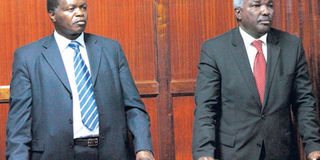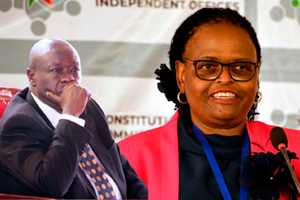Thuita Mwangi: Tokyo embassy charge in bad faith

Former Foreign Affairs PS Thuita Mwangi (right) and former Charge d'Affairs Allan Mburu in a Nairobi court in this file photo. Mr Mwangi has claimed that the Ethics and Anti-Corruption Commission had no powers to charge him over the controversial purchase of Tokyo Embassy August 29, 2013.
What you need to know:
- Mr Mwangi submits that the EACC brought three charges against him out of ulterior motive and in bad faith.
Former Foreign Affairs Permanent Secretary Thuita Mwangi has claimed that the Ethics and Anti-Corruption Commission had no powers to charge him over the controversial purchase of Tokyo Embassy.
Mr Mwangi through lawyer Katwa Kigen submitted that the EACC decided to bring three charges of abuse of office, conspiracy to commit a fraud and willful failure to comply with procurement rules against him out of ulterior motive and in bad faith.
According to the former PS, the tender committee that approved the purchase of the Tokyo Embassy and Ambassador’s residence consisted of seven members and wondered why the anti-graft body decided to pin him and leave out the others.
“The case was initiated for ulterior motives even after the investigating officer was found to be unsuitable and the prosecution selected some and left others despite the recommendations that all be prosecuted,” said Mr Kigen.
OMIT CRUCIAL INFORMATION
Mr Kigen argued that the former PS had no hand in the controversial purchase and that the EACC deliberately omitted crucial information that proved that the purchase was above board and that Kenya got value for the money spent for the property.
He accused the EACC of mistreating the former PS, arguing that the way he was arrested and bundled out of his office was meant to humiliate and destroy his career.
“The event of storming into his work place and arresting him in the full view of his juniors and cameras was inhuman and degrading when the commission was well aware he was not a flight risk,” said Mr Kigen.
Mr Mwangi alongside the Charge d’Affairs at Kenya Embassy in Tokyo Allan Mburu and Kenya’s ambassador to Libya Anthony Mwaniki Muchiri were accused of wilfully failing to comply with procurement rules in buying the Embassy.
The charges stated that the former PS and Mr Mburu allegedly purchased the property at 1.75 billion Japanese Yen (about Sh1.6 billion) while aware that a fair market price could have been obtained and used their offices to confer 318,700,000 Japanese Yen (Sh302.7 million) to Nobuo Kuriyama for the purchase.
BREACH OF TRUST
Mr Mwangi, however, challenged the decision to charge him claiming that the move was a violation of his rights and obtained orders barring the Director of Public Prosecution and the magistrate’s court from prosecuting him.
He swore an affidavit claiming that there was no breach of trust, embezzlement, theft, or kick back and that there was no evidence he was fraudulently rewarded for the transaction which caused taxpayers millions of shillings.
“The allegation of breach of trust by approving the purchase of the property while aware that the fair price could have been obtained had the proper procurement procedures been adhered to is untrue, made casually and in disregard of the facts available,” swore Mwangi.
Mr Kigen added that the process for direct procurement was followed and approved by the Public Procurement Oversight Authority and that the allegations of conspiracy and breach of trust was unfair, malicious and intended to malign the former PS name.
In any event, Mr Kigen argued that the prosecution does not challenge the composition of the tender committee which approved the purchase or present any evidence to prove the country lost money.
He added that the prosecution case against the three were defective and did not meet the threshold of charging them and urged the court to declare them unconstitutional.
The case was adjourned to September 5 to allow the other parties to respond to the issues.




